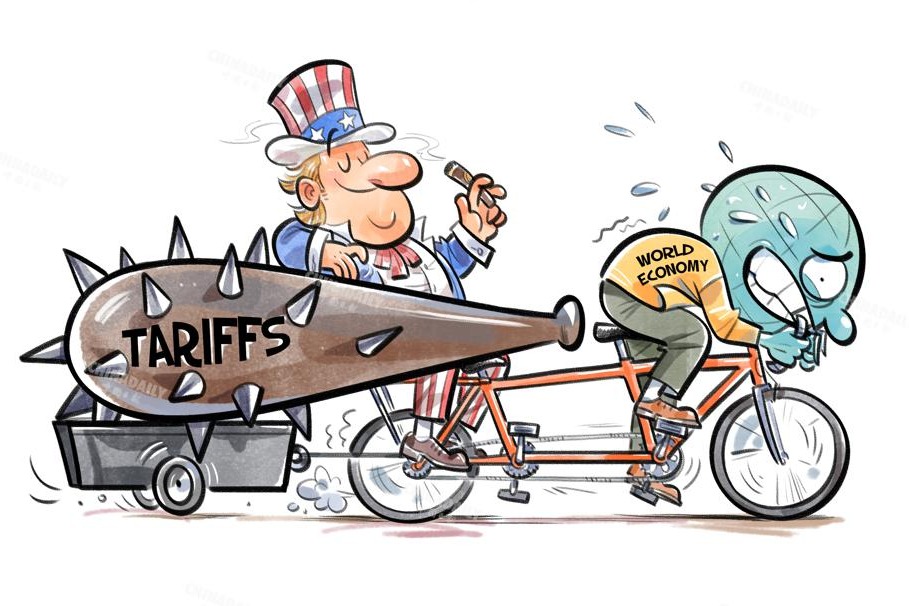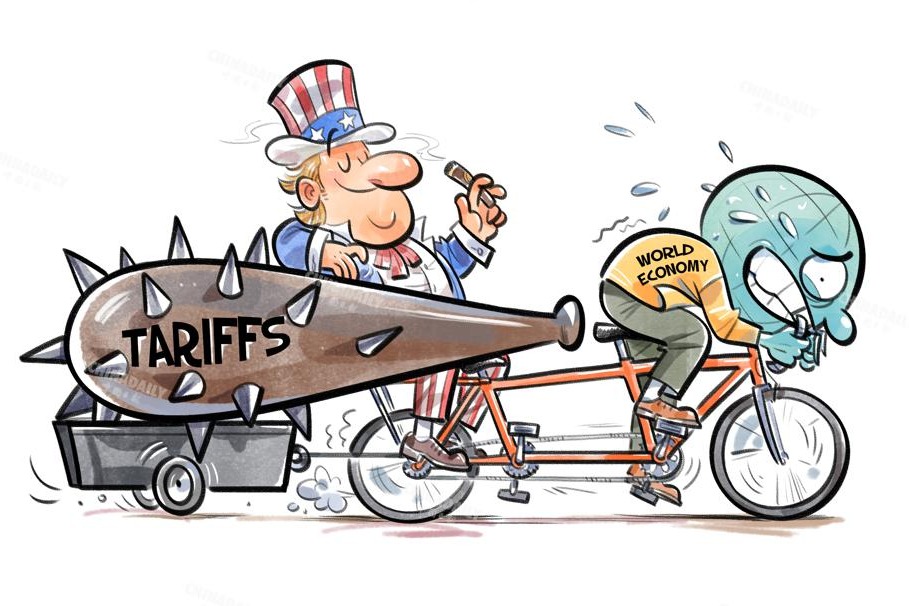Tariffs may be 'a beautiful word' but they are also heavy stones US is dropping on its feet: China Daily editorial

In a move that risks a multi-front trade war, US President Donald Trump raised US tariffs on steel and aluminum imports on Monday to a flat 25 percent. The tariff rate, to go into effect on March 12, will target millions of tons of steel and aluminum imports from countries such as Canada, Mexico, Brazil, the Republic of Korea and China.
"It's 25 percent without exceptions or exemptions," President Trump said as he signed the executive orders for the levies.
The move comes as an extension of Section 232 tariffs Trump instigated to protect domestic steel and aluminum producers on national security grounds during his first term in office in 2018, and despite the World Trade Organization ruling in December 2022 that those earlier tariffs violated global trade rules.
Moreover, President Trump said he would follow Monday's action in the next two days with announcements about reciprocal tariffs on all countries that impose duties on US goods.
In an era of economic globalization, it is natural that trade disputes should arise from time to time between trading partners. China insists that such disputes should be resolved using the WTO dispute settlement mechanism, rather than through unilateral moves such as the imposition of punitive tariffs. This is because trade and tariff wars have no winners. Even the US will feel the pain.
Studies have shown that while the metal tariffs imposed by the first Trump administration helped US steel and aluminum producers, they ended up hurting the broader US economy because they raised prices for many other industries that buy steel and aluminum to make other things, such as industrial machinery, car parts, food packaging and other products.
According to the US International Trade Commission, as cited by The New York Times, industries that consume steel and aluminum saw their production shrink by $3.48 billion in 2021 as a result of those higher costs — more than offsetting the $2.25 billion of additional US production of steel and aluminum.
And in 2020, researchers from Harvard University and the University of California, Davis, found that although Trump's tariffs created 1,000 jobs in the aluminum and steel industries, they reduced employment elsewhere by 75,000. A similar scenario will unfold, if the US chooses to escalate its tariff wars during the second Trump administration.
Economists also warn that lower-income households in the US, who are already suffering from high costs of living because of inflation, can expect an even heavier burden because essentials such as food and energy are most exposed to the import tariffs Trump has threatened to impose in the coming days.
The steel and aluminum tariffs will hit Canada and Mexico the hardest, with the former being the No 1 supplier of foreign steel and aluminum to the US, and the latter, the No 3 steel supplier. The impact of the latest US tariffs on China will likely be limited given that the country accounted for less than 2 percent of US steel imports last year, making it the 10th largest supplier of steel to the US.
Still, China stands ready to take resolute measures to safeguard its rights and interests, as it has already done previously. It is China's consistent position that while trying its best to avert an escalation in the trade disputes, it will firmly oppose any move by the US to politicize trade issues.
In a virtual interview at the World Economic Forum last month, Trump said he looked forward to "getting along with China", and expressed his belief that the two countries will "have a very good relationship".
That is indeed possible, given that fostering major-country dynamics featuring peaceful coexistence, overall stability and balanced development is a key goal of China.
The past practices of the US have proved that the beggar-thy-neighbor approach of protectionism will not solve its deep-seated problems; it will only disrupt the global industry and supply chains, roil the world economy, and undermine the interests of all countries, including itself.
Since the end of the Cold War, economic globalization has enabled thriving trade that has underpinned the rapid development of the world economy. As the world's two largest economies and significant economic and trade partners, China and the US should engage in dialogue to resolve their trade disputes and strengthen their communication to help chart a course for the healthy development of the global economy in order to realize universal benefits and common prosperity.
































